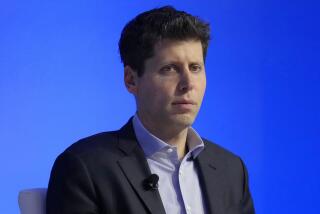Little name recognition, little baggage: why Uber chose Dara Khosrowshahi as its new CEO
In its search for a new chief executive, Uber’s board of directors could have chosen a leader with national name recognition and decades of experience at the helm of some of the world’s best-known companies — someone like Hewlett Packard Enterprise CEO Meg Whitman or departing General Electric chief Jeff Immelt.
Instead, it selected Dara Khosrowshahi, the understated chief executive of online travel booking company Expedia.
It’s a surprising choice, but one many industry analysts and investors say makes sense for a company eager to move beyond the brash leadership of former CEO Travis Kalanick, yet wary of bringing aboard a stodgier corporate influence.
As of Monday, Khosrowshahi, 48, had not yet accepted the role. A spokesperson for the board did not respond to a request for comment, and the board has not yet issued an explanation for why it chose Khosrowshahi.
Trained as an electrical engineer, the Iranian American entrepreneur cut his teeth in finance, working at investment banking firm Allen & Co. for seven years before joining Barry Diller’s media conglomerate, IAC, as chief financial officer.
He has been chief executive of the publicly-traded Expedia since 2005, during which the company’s share price quintupled. He has guided Expedia through ambitious acquisitions such as the $3.9-billion purchase of HomeAway in 2015. And despite facing fierce competition from the likes of Priceline and Google, market researchers credit Khosrowshahi with keeping Expedia in the game.
Though he’s less recognized than Whitman and Immelt, Uber probably took notice of such accomplishments, observers said.
“You could argue that Dara Khosrowshahi’s experience is more directly transferable to Uber than either Meg Whitman’s experience at HPE or Jeff Immelt’s experience at GE,” said Arvind Bhambri, a professor at USC’s Marshall School of Business who has studied successful CEO transitions. “He’s done deals, he’s worked with strong personalities, he’s managed a high-growth company, and the industry he’s in has more overlap with Uber than HPE and GE.”
“There’s not a company in travel and tourism on Earth that doesn’t know the Expedia brand,” said Phillip Wolf, founder of travel and tourism market research firm Phocuswright. “He established that global footprint.”
Well-respected among institutional investors, Khosrowshahi also appears to be well-liked. Compared to Kalanick, who was considered a divisive leader who reportedly had a my-way-or-the-highway approach to management, Khosrowshahi’s peers have described him as an attentive and approachable leader.
“He listens very carefully, he doesn’t take copious notes, but he remembers things,” said Sunil Shah, a former vice president of engineering at Expedia who worked alongside Khosrowshahi during his early years at the company. “Before he came to Expedia, he hadn’t used [the product] much. So we encouraged him to use it, and then he started to give us feedback. I’m a technologist at heart and I saw that he picks things up rapidly and asks the right questions.”
Hadi Partovi, a co-founder of education start-up Code.org who grew up up with Khosrowshahi, recalls that even in grade school Khosrowshahi was calm and approachable.
“When we were growing up in America it was right during the Iran hostage crisis, [so] we were teased in school,” Partovi said. “But he learned to make friends with anyone regardless.”
A genial approach to management is probably important for a company like Uber, which is trying to change its culture after an investigation this year unearthed dozens of complaints of sexual harassment, discrimination, bullying and retaliation.
A proven track record and a reputation of friendliness aren’t the only things Khosrowshahi has going for him, though.
Bhambri, the USC business professor, believes that one of Khosrowshahi’s key advantages is that he isn’t a household name, because it means he is less likely to bring baggage to the new job.
Big-name CEOs, such as Whitman and Immelt, can often cast a shadow over their direct reports and disempower incumbent managers, Bhambri said. Employees also have a tendency to latch onto what an executive has done in the past — both good and bad — and are quick to draw comparisons. A relatively unknown CEO, meanwhile, must establish credibility among employees, and this desire to win over workers means she or he is more likely to listen and learn.
Sometimes big-name executives come in feeling they’ve got the answers, and that can often be the kiss of death for a new CEO.
— Arvind Bhambri, professor, USC Marshall School of Business
“Sometimes big-name executives come in feeling they’ve got the answers, and that can often be the kiss of death for a new CEO,” Bhambri said. “I believe Dara Khosrowshahi is more likely to come in with an open mind and get to the issues, whether it’s the company’s internal culture, the operations, that recruitment goes as planned.”
Some analysts, however, lamented that Uber’s board of directors missed an opportunity in not hiring a woman chief executive.
“Generally, gender should not be a factor in choosing a CEO; instead, qualifications and past experience should prevail,” said Rebecca Lindland, executive analyst for Kelley Blue Book. “However, there are times when gender should play a significant role in consideration, such as when a company is recovering from a gender-based crisis of confidence.”
Eric Schiffer, CEO of Santa Ana private equity firm the Patriarch Organization, also described the board’s choice as a disappointment, saying that a strong leader like Whitman was needed to send a message and to “fix Uber’s cesspool of discrimination.”
Citing Expedia insiders, he described Khosrowshahi as a bureaucratic and political leader who might end up bogging down the company, rather than helping it meet its $70-billion potential.
On Monday, employees at Uber, who spoke on the condition of anonymity because they were unauthorized to speak to the media, said they were ready to get back to work. And if Khosrowshahi accepts the job, he’ll be joining them.
Bradley Tusk, an early investor in Uber, penned an op-ed Monday with a to-do list for the incoming CEO, including fixing the company’s culture, hiring a management team (Uber currently lacks a chief operating officer, a chief financial officer, a chief marketing officer, a head of business and a head of engineering), figuring out the company’s strategy for autonomous vehicles, finding a way to work with Kalanick who, for now, remains on the company’s board of directors, and preparing the company for a highly-anticipated initial public offering.
“Five steps, none are easy,” Tusk said. “But with the right leadership, all are achievable. Our job now is to give him the support he needs to make it happen.”
Twitter: @traceylien
Times staff writer Russ Mitchell contributed to this report.
ALSO
Who is Uber’s pick for CEO, Dara Khosrowshahi?
Uber halts Oakland expansion, considers selling building
Apple removes all Iranian apps from its App Store







